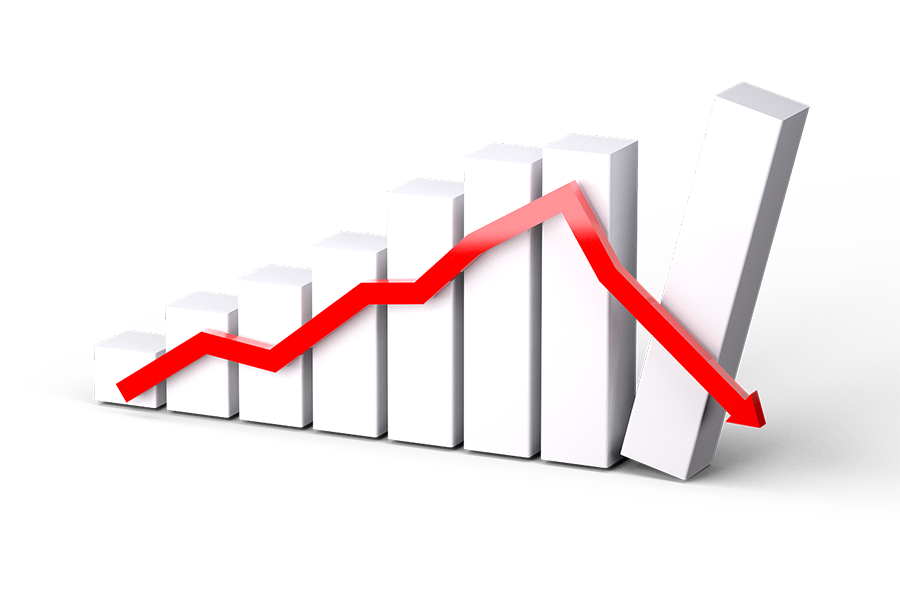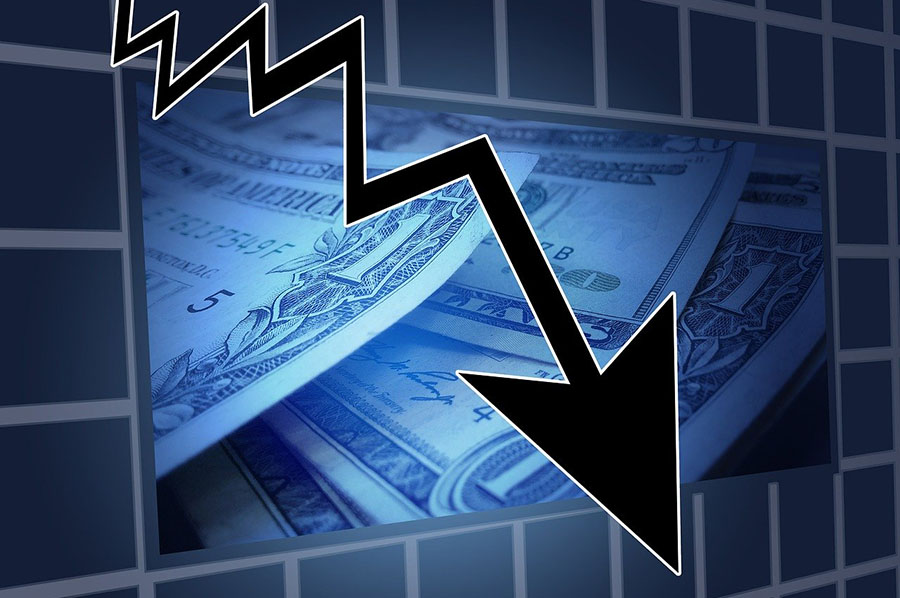The world entered the greatest financial collapse in history during the 1st Quarter of 2020. Before it ends billions of people around the world will be in poverty living on the verge of starvation as they scratch for an existence daily.
The origins go back to some well intentioned but foolish policy decisions on the part of the Clinton gang. However an almost unknown and certainly misunderstood portion of the global financial system provided the nuclear explosion that guarantees no matter what governments and central banks attempt to throw at the problem they will utterly and ultimately fail. You can no more stop the incoming tide with a bailing bucket than halt the demise of our current financial system.
It's all coming down.
The ticking time bomb sits in a corner of the world's financial system invisible to almost everyone. Yet when the clock counts down the blast will shatter every economy in the world.
It's the old story of what happens when an irresistible force meets an immovable object.
All the governments and central banks in the world make up irresistible force determined to contain the destruction of our financial system by hurling money at it.
The invisible but most dangerous portion of our financial system consists of an interesting and indeed quaint form of financial gambling called derivatives. They are mostly invisible because only three or four people in the universe have ever understood the danger.
Here is everything you need to know about derivatives. If you memorize these, I will put you on the list of people who understand the issue.
1. Derivatives get their value derived from something else. In what must be a pure coincidence that also happens to be their name.
2. Derivatives are financial wagers.
3. When bets get too large you introduce the very real issue of counterparty risk. If you are correct in making a bet but your counterparty can't pay up, you lose either way.
4. Derivatives have turned the world's financial markets into a giant casino with most of the players unable to pay off their bets.
5. When counterparties begin to fail to cover their losing wagers it will start a cascading default that will bring down the entire financial system.
But first the history of how we got to where we are.
Commodity trading and futures have been around since the dawn of recorded history. Farmers never knew what a growing season might bring so they needed protection. Consumers required some assurance that the commodity would be delivered so they needed some sort of hedge. And speculators have always been around wanting to make a bet on a good harvest or a bad harvest, they didn't really care.
While stock markets and bond markets attract the attention of investors and financial experts, most of what we use in trading goes back to how farmers and traders used commodity markets far longer than the relatively new stock and bond markets.
As a farmer, you might look around at the price of corn today and that of diesel. You know what labor is required to plant and later harvest a crop so you determine that you can raise corn at a profit. But you also need to make sure you can make enough money to pay for your inputs, that of labor, seed corn and fuel. So you go out into the futures market and sell half of what you can produce. So no matter what happens with the weather, you have a guarantee of some income. If you have a good crop and prices go up, you make a lot more money. If you have a poor crop or prices go down, you have covered your costs. After all, tomorrow is another day.
But as a speculator you might conclude the weather is going to be terrible and there will be far more demand than usual for corn so you go to the same futures market and instead of buying the futures contract the farmer just sold, you buy a call on corn at $4 expiring in September. That is a derivative. It derives its value from the price of a corn futures contract.
Likewise if you are a miner and have taken a loan from a bank the bank may have required you to presell part of your production on the commodities market for delivery in the future. Anyone buying or selling puts (a bet that prices will decline) or a call (a bet that prices will advance) is trading derivatives. The put or call derives its value from the price of gold.
That system has worked successfully for over 5,000 years. It took globalization to totally screw it up and make it into a ticking time bomb.
Globalization is one of those words that everyone uses and no one really understands. If you think there is a lot of evil in the world, you call it globalization. If you think there is a lot of good in the world, you also call it globalization. So the word itself can be used as a curse or a blessing.
I'm not sure it is either or both. I like to think of it as computerization because I think that's what it really is.
Now big brother or big sister as the case may be can watch everything we do every minute of the day. Now how can that be a bad thing?
I began working with computers in 1967 by delivering boxes of 80X80 punch cards from North Carolina to Virginia where my organization had a magic machine called a computer that somehow read the data on the cards. It added or subtracted one column from another and generated heaps of paperwork that someone used to do something. And it cost a lot of money.
You can now send far more data in a single email than all the cards I took on that journey fifty-three years ago. And it's free. Don't even ask me how email is free; I'm not that smart.
I made my very first investment in the stock market in May of 1970 after a long dismal decline in the stock market from the highs a year before. I believed prices were about to turn higher.
My broker told me about something called an over the counter thingie named a call. You could buy a call on a particular stock at a specific price that was good until a certain date. Sounded good to me so I bought a call on a stock called Great Western Finance that would expire in six months but I could exercise the call at any time. I did call the turn correctly and my investment tripled in a week. That was certainly an easy way to make money.
As computers became smaller, faster and cheaper the casino for derivatives exploded higher. Individual investors wanted to make fast bucks. Financial institutions acted as the house in a Las Vegas casino and took their cut. By 1974 the CBOE opened the first formal stock options trading floor. It was a giant success.
Financial firms looked at the incredible commissions generated from transactions in derivatives and realized that if you could bet on the price of shares of IBM two years in the future you could wager on just about anything and everything.
By 1998 the total amount of money staked on derivatives grew to almost $100 trillion. Given that the total world GDP was only about $46 trillion, the then head of the CFTC, Brooksley Born, went to Congress and insisted that reins be put on the market. At $100 trillion it was out of control.
You see, the thinking at the time was that the use of derivatives splits up risk. In practice, the use of derivatives actually multiplies risk. It doesn't spread it around. It concentrates it.
At some point the issue is no longer "will the price of corn or wheat or gold go up or down," it becomes "is this bet so large that if I am correct the person on the other side can no longer pay up."
Larry Summers, Alan Greenspan, Robert Rubin, the masters of Wall Street pulled in all their favors and smacked Ms. Born soundly and her warning went unheeded. Congress actually expanded the derivatives market.
In 2008 her warning came true as the myriad of various bets on anything and everything brought the financial system to its knees. One of the more interesting examples was the insurance company named AIG. Their tiny London office made credit default swap bets on a number of companies that went south. The Federal Reserve had to bail them out to the tune of $85 billion else they take down their counterparty Goldman Sachs.
That was the single moment in time when the Federal Reserve had the chance to make a decision that would allow the sickness of the financial system to heal. All they had to do is let the financial firms that had made the stupid bets to fail.
If you are in business you make bad decisions and lose all your money, you should fail. That's why we have bankruptcy laws. Failure is both normal and common. After all, people do a lot of stupid things and make poor choices.
Why should taxpayers pick up the tab for the insanity of Goldman Sachs and AIG? There are lots of insurance companies around that are well run and surely they could pick up the business AIG lost. Likewise there are dozens of financial institutions that would love to take business from a Goldman Sachs corpse.
When Brooksley Born made her predictions in 1998 derivatives were only about $100 trillion. In 2008 banks and financial firms realized they could steal and get away with it. What a perfect world, they got the profits and bonuses and the taxpayers got stiffed with the losses. How could life get any better?
Today derivatives are over $600 trillion.
Banks, airlines, even churches and Jewish NGOs are lining up to suck from the government teat. But the rot is so firmly entrenched and the corruption so deep that it will bring down the entire financial system in the world. The numbers are way too big for any government to succeed in bailing out this sinking ship.
They will try ten different solutions and all will fail.
To be continued in part V.
Solutions that would work.
Common Sense 2.0 Part I available here.
Common Sense 2.0 Part II available here.
Common Sense 2.0 Part III available here.
Disclosure:
1) Statements and opinions expressed are those of the author and not of Streetwise Reports or its officers. The author is wholly responsible for the validity of the statements. Streetwise Reports was not involved in any aspect of the article preparation. The author was not paid by Streetwise Reports LLC for this article. Streetwise Reports was not paid by the author to publish or syndicate this article.
2) This article does not constitute investment advice. Each reader is encouraged to consult with his or her individual financial professional and any action a reader takes as a result of information presented here is his or her own responsibility. By opening this page, each reader accepts and agrees to Streetwise Reports' terms of use and full legal disclaimer. This article is not a solicitation for investment. Streetwise Reports does not render general or specific investment advice and the information on Streetwise Reports should not be considered a recommendation to buy or sell any security. Streetwise Reports does not endorse or recommend the business, products, services or securities of any company mentioned on Streetwise Reports.
Do you invest in the stock market, or have you always wanted to learn more about investing? Streetwise Reports is dedicated to sharing interesting and not always so well known investment ideas. We get our stories from the industry experts, and we want to share them with you. If you're interested in learning more, check out www.streetwisereports.com!














